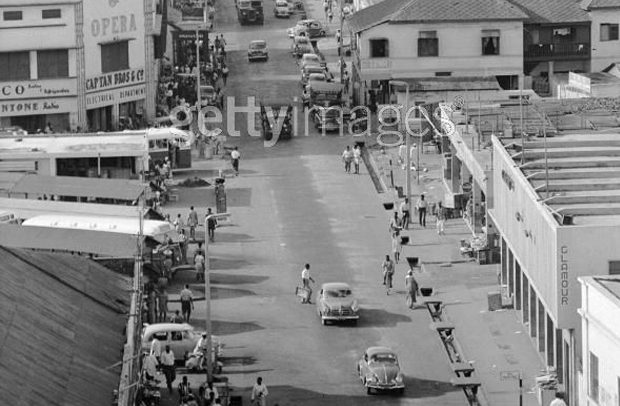One European’s impression of the Gold Coast a year before independence when he assumed duty as information officer in Accra is worth reading.
Mr. Richard Macmillan who was honoured with an honour of the Order of The British Empire, OBE, was a journalist and teacher of journalism of outstanding pedigree.
When he wrote these impressions, the opener was about the traffic policeman he saw every morning on what was called Dodowa Road.
His description of the cop as exhibiting the traits of the British police officer in terms of politeness and other qualities, suggested how good the Gold Coast police were before independence.
We have heard so much about how police officers at a time when the British were in charge had to conform to the standards of their profession or face the appropriate music.
We have, for instance, heard about how the escort cop would not receive a bribe and would certainly march a suspect to the police station as he was instructed to do by his superior officers.
It is this discipline which Richard witnessed when he landed in the Gold Coast. The standards the British officers imparted through instructors at the Police Depot in Accra were in full flight during the days of the Gold Coast.
He wrote, ‘I like, first of all, the policeman. Maybe that is because most of them seem to show all the traits of British training. Thus, they are polite and-more important still-good humoured. As I come down the Dodowa road each morning, I like to exchange salutes with the traffic policeman; again with the two officers on duty in Boundary Road’.
Boundary Road is in Adabraka and it is interesting to note that even in those days, Accra witnessed a relative degree of traffic jams as Richard McMillan mentioned in his observations.
‘In the midst of their task of unsnarling the ever-increasing volume of 8am traffic, they find time to return my smile and salutation,’ he said.
Richard was not happy though about the smallness of the umbrella used by the traffic cops on duty. ‘But why such a small umbrella for those at the main traffic junctions in both Station and Boundary Roads? I should like to see something in colour, large and picturesque, like the sunshades used by the Police on the French Riviera which add so much to the typical chiaroscuro of the brilliant picture of the Cote d’Azur. They would give a new gaiety to the Accra scene, blending with the pastel shades of the brilliant skyline.’
Of the Gold Coasters that he met in Accra, he said, they exuded a certain excitement about being part of a chapter of the country’s evolvement as independence beckons. This, he captures thus, ‘I like the air bustle and excitement of Accra. It hits one immediately upon arrival; you have the impression of an eager people aware that they are living in exciting days, conscious of the fact that they are part and parcel of a most vital chapter in their country’s history as the Gold Coast moves along the path to independence.’
About the excitement, he wondered whether the people appreciated the responsibilities that independence bestowed upon them as a people.
That was an appropriate observation because most people, most likely, expected the new political status to usher in a certain level of wealth to their individual persons with the departure of the colonialists.
No wonder some years after independence, some persons began getting disappointed because they expected so much yet saw so little or nothing in their living conditions.
Richard McMillan said he loved the changing face of the Gold Coast after comparing what he saw over a decade ago and now, 1956.
‘The changing face of the Gold Coast-I like that too. I first saw Accra some twelve years ago and, frankly, I was not favourably impressed. Coming back now, I find it is evolving into a city which shows signs that one day it may be really as beautiful as it could and should be,’ he said.
Continuing he said ‘we know that there are still a lot of eyesores but many of them are going and when you look at the skyline and see the rather graceful buildings that have sprung up or are in the course of mushrooming, the pattern of a graceful capital of the future becomes visible.’
Residential Areas
Of the modern setting where he stayed he wrote about it thus ‘and so many of the residential areas are really delightful. I live in the Cantonments and on all sides my eye catches evidence of the harmony of the Afro-European architecture of today- modernistic villas and bungalows nestling behind a plethora of colour from palm-trees and bougainvillea, moonflowers, hibiscus and many other tropical and sub-tropical flora. In the distance I can see rose-red rooftops, apple-green facades, and shining white walls, all set against the brick red backdrop of the laterite earth and the cobalt sky.’
Richard McMillan’s descriptions Accra in 1956 without pictures tells us a lot about the city prior to independence especially Cantonments the highly priced residential suburb occupied by of course the elite of society even as it is so today.
He continues ‘except after dark I like the motorists- the taxi drivers , the mammy wagon drivers (trotro drivers), the private automoblist. They are polite and helpful, they obey the rules of the road, I think, better than those in many countries I know and they will willingly give you a hand if you are in trouble.’
This wonderful testimonial about trotro drivers of the 50s is in sharp contrast to the status quo. It therefore indicates how far we have dropped in the discipline index over the years.
To Be Continued
By A.R. Gomda

